I am fascinated by “citizen technology.”
That’s a terrible name for it, because it implies digital government technology, which is not what I’m talking about. (Although that too is a fascinating topic for discussion on another day.)
Rather, the labels of citizen analyst, citizen data scientist, citizen developer, citizen integrator, etc., refer to people who are not experts in a particular discipline — such as data analysis, data science, software development, systems integration, etc. — but who are able to wield a new generation of tools to accomplish tasks in those disciplines as if they were experts.
An easy example of this is website creation. Back in 1994, if you want to create a website, you needed to know HTML, how to set up an HTTP server, how to run it on a Linux box somewhere, etc. It pretty much required an IT discipline expert.
Over time, however, new tools enabled non-IT experts to build websites too. For a while, you still had to be a “power user,” even to figure out something like Microsoft FrontPage.
But today, anybody can build a beautiful website in minutes with tools like Squarespace and Wix. Superbowl advertisements for these services have become a cottage industry.
An earlier example of this was the desktop publishing revolution, and the journey we’ve taken from Linotype machines to Google Docs.
Ironically, the best way I can describe this phenomenon is to use another political-sounding phrase: the democratization of technology. It’s a progression of taking the power to create and discover out of the hands of an elite few and putting it in the hands of the everyday many.
Instead of “one person, one vote,” it’s more like “one person, one app.” Or one person, many apps, which some might call Chicago style (sorry, bad joke in today’s political climate).
At the MarTech conference last month in San Jose, I moderated a keynote panel with four leaders from some of the hottest companies in this “citizen technology” space: Elissa Fink, CMO of Tableau; Wade Foster, CEO of Zapier, Andrew Ofstad, Co-founder, Product of Airtable; and Linden Tibbets, CEO of IFTTT.
They all disliked the name “citizen technology” too, although they resisted offering a better suggestion. (Except Elissa, who mentioned she’d heard the phrase “accidental data scientist” — someone who started using these democratized tools out of necessity to complete some task that no one else was going to do and suddenly found that they were pretty good at it.)
But they all agreed that they were disrupting the tightly-controlled limitations of previous IT regimes, accelerating the empowerment of highly-distributed and agile organizations. (Linden and Wade, whose businesses align most closely with the term “citizen integrator,” remarked that they were disrupting the classic forces that would have driven greater consolidation in marketing technology.)
This is an engine of revolution, and in our domain, it’s revolutionizing martech.
5 Stages of Technology Democratization
Here’s one way of visualization what’s happening with the democratization of technology:
When a technology first enters a market, it often requires specialized expertise to leverage it. In business technology, this has typically been the realm of the IT department.
Because of the specialized technology skills required, building things with the technology is expensive — it tends to cost a lot of time and money. As a result, the volume of things created with the technology is relatively small, and the rate at which they’re created is relatively slow.
But over time, the technology advances and gets packaged in ways that require less expertise in the technology itself. Instead, the advantage shifts to people who better understand how to apply the technology in the context of some particular domain, e.g., marketing.
The cost of creating things with the technology drops and the volume of things created — and the rate at which they’re created — rises.
To return to our early examples of building websites and desktop publishing, we’ve gone from a world of scarce and expensive websites and typeset documents to a world of essentially infinite websites and typeset documents that nearly anyone can create for free (or at least for freemium).
I propose that there are five stages that technology goes through as it’s being democratized, at least in the context of business, which can be categorized by the groups of people who are able to successfully wield it in their work:
- Discipline Experts — tech professionals who are primarily masters of the core technology, independent of the domain in which it’s applied, e.g., IT developers who build solutions for other departments.
- Domain Experts — tech professionals who master the technology in a particular domain, e.g., marketing technologists who build solutions within the marketing department.
- Power Users — non-tech professionals who nonetheless develop advanced technical skills in leveraging the technology, e.g., tech-savvy marketing automation platform administrators.
- Users — non-tech professionals who are able to use the technology in a form that doesn’t require much technical skill (although it may still require domain skill), e.g., regular digital marketers.
- Ambient/Automatic — technology just works within the domain without users needing to explicitly manage/operate it, e.g., where automation or AI simply take over the work.
With citizen developer platforms — tools that democratize the development of mobile and web apps — we steadily see the evolution from code, to low code, to no code, to eventually creation through experiences that don’t even feel like a “builder” process, and how this maps across discipline experts, domain experts, power users, and regular users.
This pattern is repeating itself today with a number of technologies related to marketing. Here are a few examples:
- data integration (e.g., Zapier)
- data analysis (e.g., Looker)
- data visualization (e.g., Tableau)
- interactive content (e.g., ion interactive)
- database app development (e.g., Airtable)
- web app development (e.g., Outsystems)
- mobile app development (e.g., Buildfire)
- graphic design (e.g., Canva)
As marketing technology is democratized and crosses into broader categories of people who are able to wield it, very interesting inflection poinnts occur. For example, the transition from discipline experts (IT) to domain experts (marketing technologists) at scale triggered the whole marketing technologist movement.
As more of these technologies are democratizing to power users and regular users, I believe an even bigger empowered marketer movement is emerging. I’m tempted to call this “the rise of the marketing maker,” an adaptation of maker culture to marketing, where every marketer has DIY superpowers to build and analyze digital experiences.
Just as the rise of the marketing technologist required organizations to rethink the interplay of marketing, technology, and management, I believe this next marketing maker movement will dramatically alter the dynamics of marketing too.
I think it will be an even bigger inflection point.
It will be faster, cheaper, and easier to create and analyze more and more sophisticated digital experiences. It will unleash tremendous parallel innovation all across marketing, as previous bottlenecks from idea to experiment to deployment at scale melt away.
It’s going to require us to, again, rethink marketing management in this new environment. I’m looking forward to digging into this as the next big wave of martech.
Citizen Technology is Disruptive Innovation
One more thought about the democratization of (marketing) technology that I’ll share here. It perfectly aligns with Clay Christensen’s model of disruptive innovation:
There are “jobs to be done” in marketing, from low-end use cases up to high-end use cases. I think we can approximately associate different groups of people applying technology to these levels of use cases: power users on the low-end up to discipline experts (IT) on the high-end.
A given “citizen technology” tool is essentially a disruptive innovation. When it starts out, it’s capabilities are usually quite limited. You wouldn’t be able to use it to solve most of the use cases that people are applying greater expertise towards, at least not initially.
However, it’s often ideal for building things and solving problems that the “experts” previously wouldn’t have been willing to spend time on. It would have been too expensive to wield earlier expert-only generations of the technology to address some small need.
But the citizen technology tools work great for it. This is low-end disruption.
Yet over time, the citizen technology tools continue to improve. As they do so, they become a viable solution to low-end use cases that were previously addressed by more expensive solutions. And then they subsume mid-range use cases. And eventually high-end use cases.
At the top of that disruptive innovation curve, citizen technologists are able to do things that previously required discipline experts.
Cost drops. Volume and rate of creation skyrocket. A whole new era of marketing awaits.
Everyone’s going to be a marketing maker.
P.S. If you have a suggestion for a better name than “citizen technology” for this whole cross-category collection of democratizing tools, let me know.


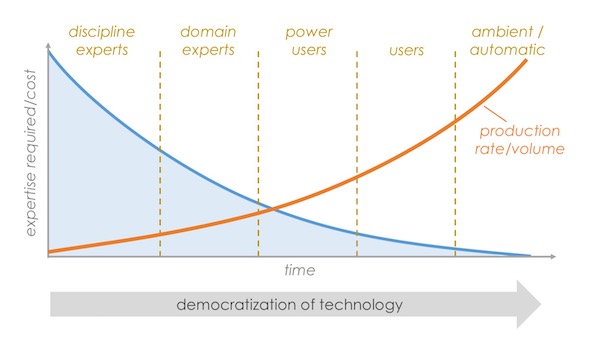
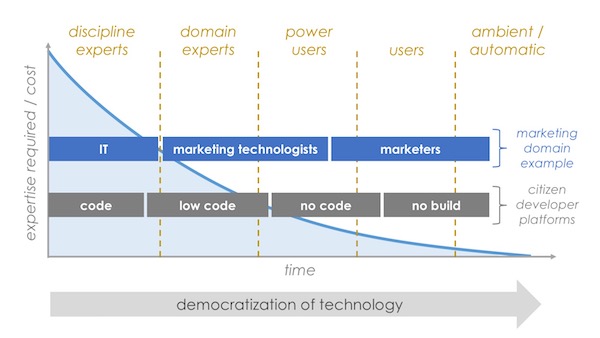
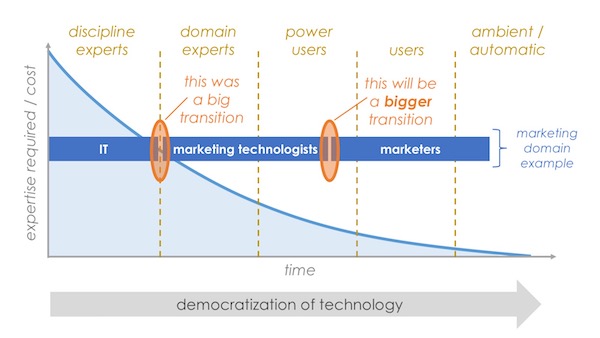
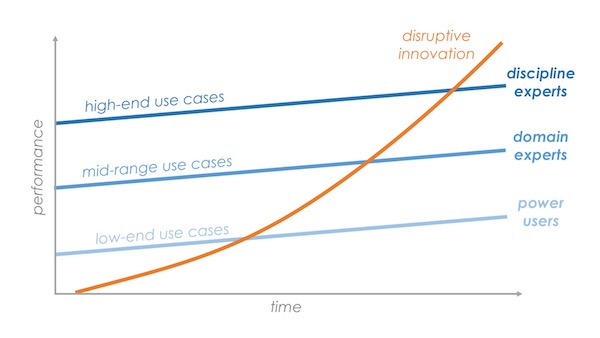
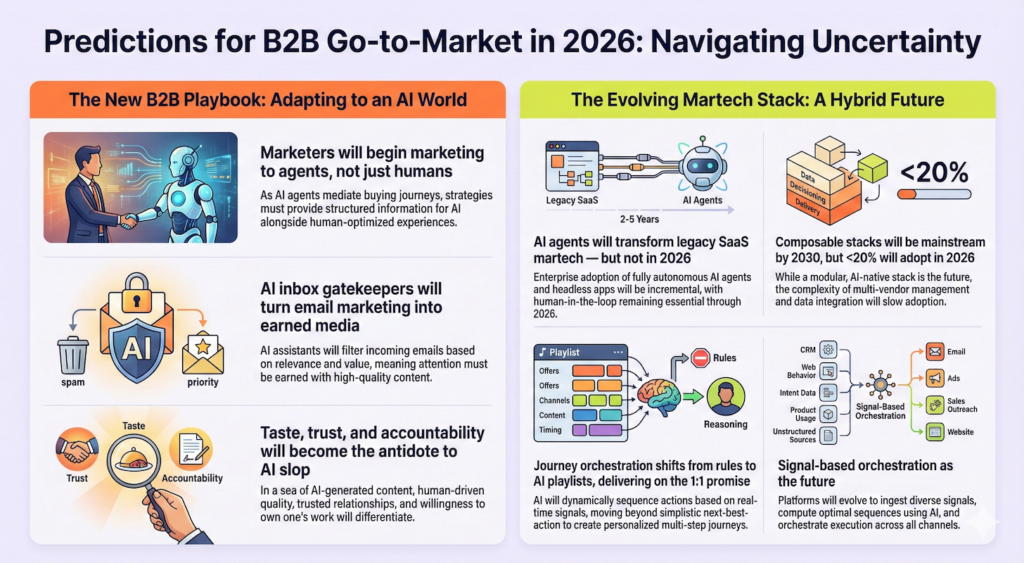
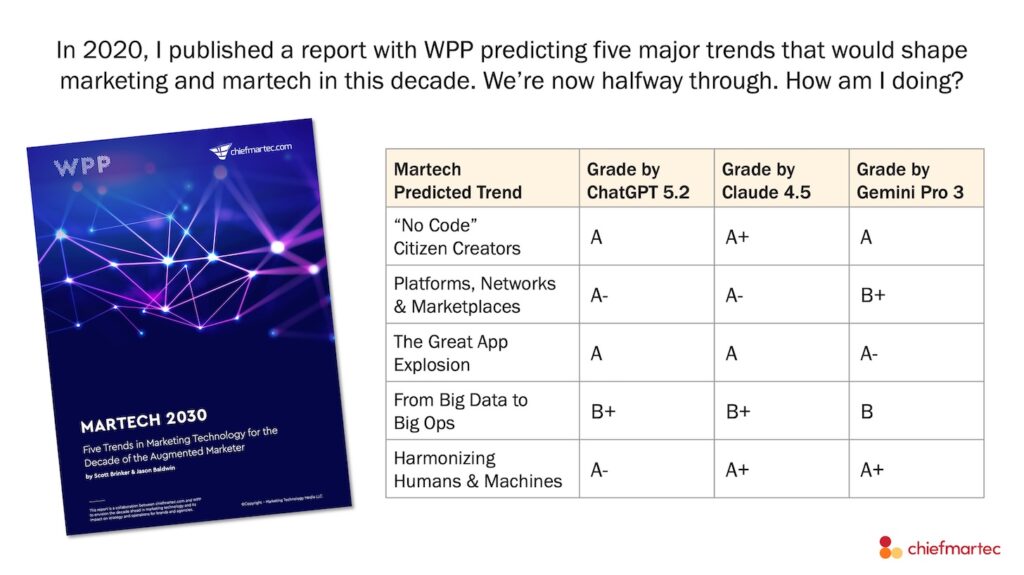
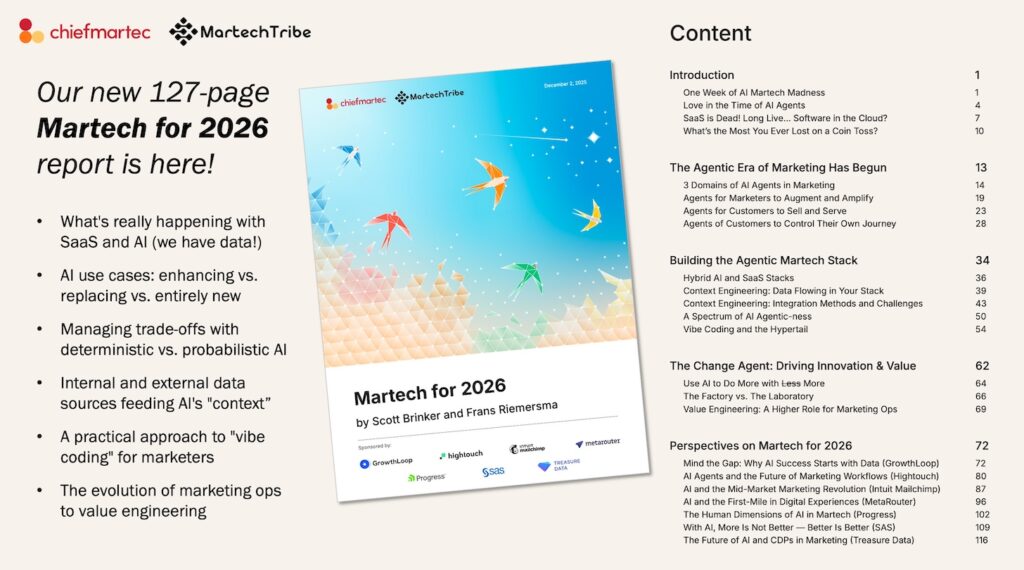
DIY Technologists?
>If you have a suggestion for a better name than “citizen technology” for this whole
>cross-category collection of democratizing tools, let me know.
All democratization tools have one specific goal: “empowering (marketing) people to do things they couldn’t do before because of a lack of technological skills”.
Therefore, “Empowering Technology” is one way to describe this category – focusing more on the result from a users’ perspective.
Why not just “democratized technologies”?
Prosumer Technology
Thanks Scott. Great article and one we wholeheartedly agree with having built the worlds first low code enterprise website platform (www.cohesiondx.com). Agree with Andreas on empowering. Many of the users are still experts, just in a different domain. Empowering Tech speaks to this well. As you stated in your opening “citizen” is open to interpretation (mis) and is likely to remain so.
As a veteran in Econometry I suffered back in the late 80’s launching batch scripts to a VAX machine from my University CPD and have no clue of whats hapenning.
A day after I went to the campus and get the results of a Linear Regression printed on daisy wheel printer.
Today you open Excel and get a awesome set of advanced statistical algorithms and on top of that it offers you the results on a plain business language (no beta stimations, t-student,…).
I guess that instead of Citizen Technology we will probably call it Office 360 Marketing Edition (for 360º Customer View)
p.s.. I don’t work or have any relationship with MS 😉